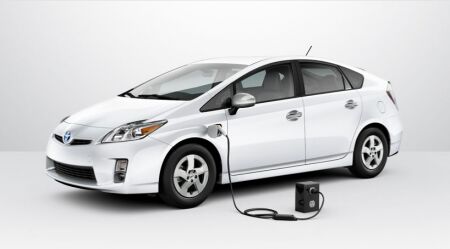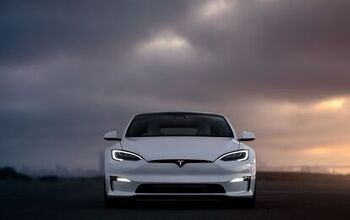Oregon Considers Per-Mile Tax On Fuel-Efficient Vehicles

“Everybody uses the road and if some pay and some don’t then that’s an unfair situation that’s got to be resolved,” said Jim Whitty, manager of the Oregon Department of Transportation’s Office of Innovative Partnerships and Alternative Funding.
Ah, yes. As with any number of current governmental activities, the rationale for per-mile taxation will be fairness.
With the recent American election safely delivered into the appropriate hands, there’s no longer any need to sugar-coat the facts of life in the United States, is there? So let’s not. The unemployment rate is dipping because many people have simply given up and have either stopped looking for work or have dropped off the five-year cliff beyond which the Bureau of Labor no longer considers people unemployed – as if being unable to find a job for five years and one day was somehow equivalent to swanning one’s way off to Sun City, AZ. Meanwhile, we’re reassured that the middle class hasn’t disappeared — it just looks like the lower class now.
This modern life, this grey parade of single mothers and hopeless, underemployed men listlessly piloting the oldest automotive fleet in the country’s history between 29-hour-a-week “part-time” jobs, dismal food, and lonely evenings lit only by the constant flickering of the Internet as the one-percenters and rich kids of Instagram breeze past in an ever more obscene panoply of tasteless, pumped-up hyper-SUVs and bluff-faced, BMW-based Rolls-Royces. It’s not just bad for morale. It’s bad for taxes. And if some of the nation’s proles have the nerve to swing a loan for a more fuel-efficient car in the hopes of simultaneously preserving scarce resources and making a long-term positive economic impact in their own lives… well, something will have to be done.
The Statesman-Journal reports that Oregon has started a pilot program to study the implementation of a per-mile travel charge. This was apparently done in response to stricter CAFE standards and concerns that a smaller fleet of more fuel-efficient vehicles would impact gas taxes, which are already declining as more and more people just stay home.
Under the pilot, about 50 participants in Oregon paid 1.56 cents per mile and received a credit for the gas tax they paid at the pump. Participants, which mainly included transportation officials and lawmakers, chose from five plans with different ways to track miles driven and pay their bill.
They could report miles driven using a smartphone application, a geographic positioning system device or a reporting device without GPS.
Participants could also pay a flat annual charge or opt out of using a gadget in the vehicle to record miles.
The existing state gas tax is thirty cents per gallon, so this program would effectively return revenues to the days when the notoriously thirsty Ford Explorer was simultaneously doing 400,000 units or more a year and punishing the buyer of each one with real-world fuel mileage in the 15-mpg range. If you’re wearing a tinfoil hat right now, you’ve no doubt considered a likely implementation scenario where the flat fee will be based on a very high annual mileage and payable in a high-three-figure lump sum, while the privacy-eroding GPS-tracking device will be easy to use and the most affordable choice.
Insofar as this program deliberately encourages people to hold on to older, less fuel-efficient vehicles, the Obama administration will surely have an opinion on Oregon’s antics. The state’s famously liberal urban residents might also have a strong opinion about a program that seems targeted at electric and plug-in vehicles. One question perhaps not covered in the pilot program is this: If a young man lets a pair of valets put two hundred miles on his father’s vintage Ferrari, will running it in reverse on a pair of jackstands result in a tax refund?

More by Jack Baruth
Latest Car Reviews
Read moreLatest Product Reviews
Read moreRecent Comments
- Ash78 Dear unions, thank you for your service and for expressing interest in our automotive factories. Due to your many decades of pressuring employers to do better, the more adept companies have gotten your message and have implemented most of your demands preemptively in order to maintain a better employer-employee relationship than the manufacturing industry as a whole.We truly appreciate your feedback and interest, and all it has done to improve employer relations since the industrial revolution. We take your concerns seriously and will be glad to reach back out if our situation changes.We will keep your resume on file for three years, per company policy.Sincerely,Everyone
- Theflyersfan I'm having a tough time figuring out Mazda's recent lineup decisions. I've mentioned before how having the CX-5 and CX-50 makes no sense as it seems like they would steal each other's sales instead of conquest sales from other brands. And now here comes the CX-70 vs 90 decision. If Mazda wanted to position the 70 above the 90 with pricing, I think they should have gone the Audi Q7 vs Q8 route. The Q8 costs more, has one fewer row, and is smaller on the inside, but has the more aggressive styling and tries to position itself as the sportier alternative large CUV in their lineup. With Mazda, the 70 and 90 seem to be in the position, like the 5 vs 50, to steal each other's sales. There isn't anything compelling me to get a 70 if I get more for my money with a 90, except 100,000 miles down the road, I won't have a folded up third row seat rattling around loosely. Mazda should have brought over the CX-60 and position that where they wanted the 70. I understand it's a touch larger than the X3, Q5, and GLC CUVs, which is a sweet spot in that market. Make the CX-70 a sportier alternative 2-row instead of such a blatant cynical move of just ripping a seat out of the 90, calling it an all new model and price it in the same ballpark. I want Mazda to succeed and continue to be independent, but decisions like these make me wonder what their future plans are.
- Daniel J This thing is just too big and not packaged great being RWD. I'd prefer a FWD/AWD pre 2024 Santa Fe sized vehicle. A true CX-70.
- Ash78 Now that we're on the topic, I think Apple owes us all a ton of money for bringing out new phones every 1-2 years and devaluing the one I have! /sDepreciation has always been a part of car ownership, far more so now if you're getting into EVs. I think it's just the discrete nature of these depreciation events (ie, price cuts) that have everyone wringing their hands.I'm too price sensitive -- not necessarily to BUY an EV -- but for the fear of what a truly disruptive battery tech might do to them. Split the differene with a hybrid or PHEV and you've reduced your car's reliance on battery tech as the primary determinant of value.
- Ash78 Interesting take on the pricing...superficially illogical, but Honda has been able to sell the Pilot Junior (er, Passport) for more than the Pilot for several years now. I guess this is the new norm. I have 2 kids, who often have friends, and I feel like the best option here is buying the CX-90 and removing the third row completely. It won't be pretty, but it adds useful space. We've done that in our minivan several times.I've been anxiously awaiting the 70 for over a year, but the pricing makes it a non-starter for me. I like the 50, but it's tight (small, not dope/fire/legit); I like the 90s, but it's more than we need. This "Goldilocks Solution" feels like it's missing the mark a little. Mazda could have gone with more of a CX-60 (ROW model) and just refreshed it for the US, but I suspect the 90 was selling so well, the more economical choice was just to make it the same basic car. Seems lazy to me.


































Comments
Join the conversation
So basically, Oregon wants to collect additional tax revenue from everyone who averages 20mpg or more (30 cents/divided bu 1.5 cents gives you almost 20). Fair enough I guess. Perhaps back in the day, when the fleet average mpg was 20mpg or less, the gas tax was sufficient to fund road maintenance, but now it's not. If you drive 15,000 miles in a 40mpg vehicle, then you end up paying about $225 in road tax but get refund of about $110 for the gas tax paid. I don't see a huge burden there, and this technique is far less intrusive than carrying a GPS device.
Where are all the practical, pragmatic lefties on this one? The correlation with fuel tax payments and road repair is pretty reasonable for all traditional vehicles. It's an insanely efficient tax with little cheating and near zero collection cost. Any per mile scheme is bound to overwhelm any fairness gain with collection costs. So EVs aren't paying their fair share? Fine. Figure something out. Take it out of their subsidy, tax it at the charger, whatever. Make the tax fair, non intrusive, and not require another pile of frigging forms and all is good. And, raise the fuel tax and fix the roads.